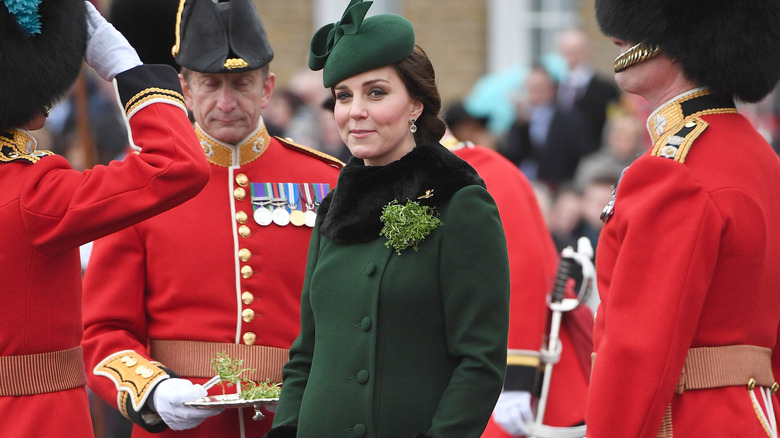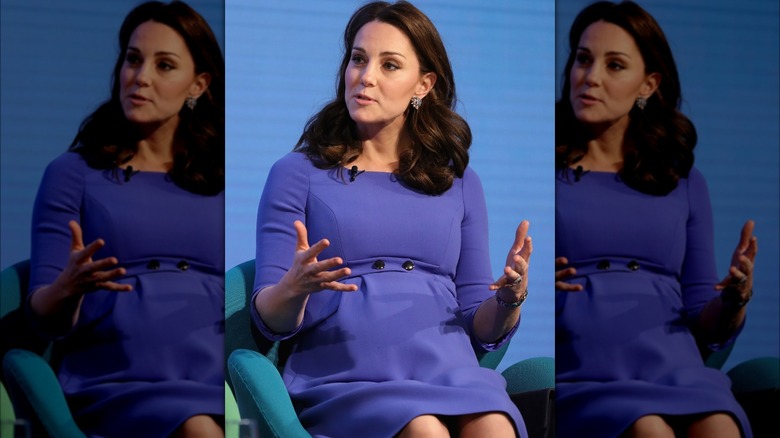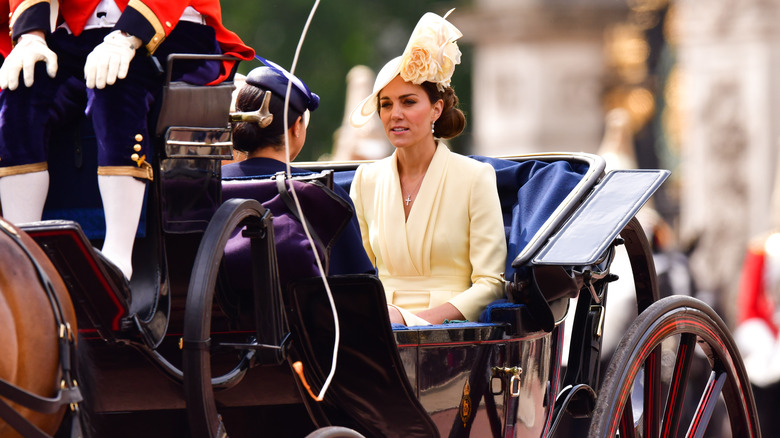What Kate Middleton Said About Her Health Issues During Her Pregnancies
Before she underwent abdominal surgery at The London Clinic, Kate Middleton was no stranger to hospital stays. In addition to the time she spent at St. Mary's Hospital during the births of her three children, she also had to be hospitalized for three days while she was pregnant with Prince George. Kate was suffering from hyperemesis gravidarum, a severe form of morning sickness that she experienced during each of her pregnancies.
As well as a lot of discussions about her health, Kate's long recovery and disappearance from the public eye after her surgery has sparked some disturbing theories. Some users on X, formerly known as Twitter, have suggested that Kate's past experiences with hyperemesis could be connected to her latest health issues, but there's been no indication that this is the case.
Pregnant women are most at risk for hyperemesis during the first trimester, according to Cleveland Clinic. Describing the condition as morning sickness is a bit of a misnomer, as it causes bouts of nausea and severe vomiting multiple times a day. The latter can result in serious issues such as vitamin deficiencies and dehydration, which may require a hospital visit to have fluids administered intravenously. Kate has done a lot to raise awareness of the rare, debilitating condition by speaking about it. Thanks to her, other women struggling with hyperemesis can now point to her story when they need to stand up to their doctors and insist that crackers and ginger ale aren't going to cut it.
How Kate Middleton managed her hyperemesis gravidarum
Kate Middleton's first bout of hyperemesis gravidarum happened in 2012 and resulted in the princess suffering from severe dehydration. After she spent three days at King Edward VII hospital, she stepped outside with a rose bouquet in hand and smiled for the waiting photographers. The Mirror observed that she "looked washed out." (Ugh.)
Kate also suffered from hyperemesis during her other pregnancies. While there were no reports that she had to spend days in the hospital again, Kensington Palace did share that she was undergoing treatment for the condition when she was pregnant with Princess Charlotte in 2014. During Kate's third pregnancy in 2017, Prince William revealed one remedy his wife had tried to curb her nausea. "Ginger biscuits. But there's not much ginger can do to stop that," he told an attendee at a charity event, per Hello!.
During a 2020 appearance on the "Happy Mum, Happy Baby" podcast, Kate revealed that she used the hypnobirthing technique during at least one of her births. It's a form of pain management that promotes relaxation through breathing exercises and visualization. According to Kate, what she learned from hypnobirthing helped her manage her hyperemesis. "I really realized the power of the mind over the body," she said, adding, "I saw the power of it really, the meditation and the deep breathing and things like that ... I realized that this was something I could take control of."
Kate Middleton suffered from a related health issue
Mothers-to-be who have a history of experiencing motion sickness have a higher risk of developing hyperemesis gravidarum, according to Cleveland Clinic. In 2019, Kate Middleton reportedly suffered from a bout of motion sickness when she had to ride in a carriage during the Trooping the Colour. An insider told the Mirror that Kate had experienced seasickness before and that she received a recommendation for motion sickness medication from the late Queen Elizabeth II.
A group of mothers who have experienced hyperemesis told BBC News that their nausea didn't stop completely after they gave birth, but what triggered it for them was usually a reminder of their harrowing experience, such as the smell of something they consumed before vomiting. "Lots of people have it far, far worse," Kate said of her hyperemesis experience during her "Happy Mum, Happy Baby" interview. She also spoke about how it affected her loved ones, saying, "William didn't feel he could do much to help and it's hard for everyone to see you suffering without actually being able to do anything about it." According to Kate, it made eating properly impossible for her.
While the cause of the condition long remained a mystery, in 2023, a study published in Nature linked it to a specific hormone produced by the fetus during pregnancy. The discovery may help scientists develop treatments that save mothers-to-be from experiencing the same misery that Kate went through three times over.



